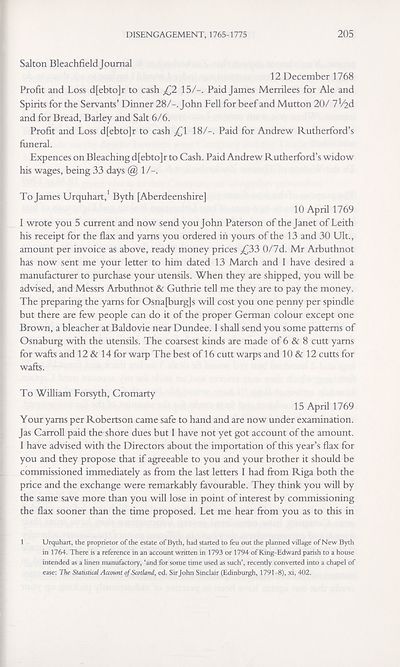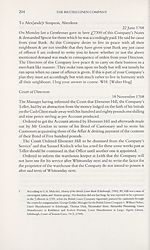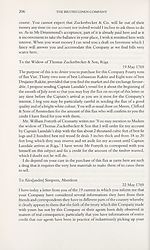Series 5 > British Linen Company, 1745-1775
(222) Page 205
Download files
Complete book:
Individual page:
Thumbnail gallery: Grid view | List view

DISENGAGEMENT, 1765-1775
205
Salton Bleachfield Journal
12 December 1768
I Profit and Loss d[ebto]r to cash _£2 15/-. Paid James Merrilees for Ale and
Spirits for the Servants’ Dinner 28/John Fell for beef and Mutton 20/ 7V^d
and for Bread, Barley and Salt 6/6.
Profit and Loss d[ebto]r to cash £1 18/-. Paid for Andrew Rutherford’s
I funeral.
Expences on Bleaching d[ebto] r to Cash. Paid Andrew Rutherford’s widow
his wages, being 33 days @ 1/-.
I To James Urquhart,1 Byth [Aberdeenshire]
10 April 1769
[' I wrote you 5 current and now send you John Paterson of the Janet of Leith
his receipt for the flax and yams you ordered in yours of the 13 and 30 Ult.,
I amount per invoice as above, ready money prices £33 0/7d. Mr Arbuthnot
s has now sent me your letter to him dated 13 March and I have desired a
manufacturer to purchase your utensils. When they are shipped, you will be
j advised, and Messrs Arbuthnot & Guthrie tell me they are to pay the money.
The preparing the yams for Osna[burg]s will cost you one penny per spindle
but there are few people can do it of the proper German colour except one
! Brown, a bleacher at Baldovie near Dundee. I shall send you some patterns of
Osnaburg with the utensils. The coarsest kinds are made of 6 & 8 cutt yams
L for wafts and 12 & 14 for warp The best of 16 cutt warps and 10 & 12 cutts for
wafts.
I To William Forsyth, Cromarty
15 April 1769
i Your yams per Robertson came safe to hand and are now under examination.
Jas Carroll paid the shore dues but I have not yet got account of the amount.
I have advised with the Directors about the importation of this year’s flax for
you and they propose that if agreeable to you and your brother it should be
1 commissioned immediately as from the last letters I had from Riga both the
price and the exchange were remarkably favourable. They think you will by
the same save more than you will lose in point of interest by commissioning
the flax sooner than the time proposed. Let me hear from you as to this in
1 Urquhart, the proprietor of the estate of Byth, had started to feu out the planned village of New Byth
in 1764. There is a reference in an account written in 1793 or 1794 of King-Edward parish to a house
intended as a linen manufactory, ‘and for some time used as such’, recently converted into a chapel of
ease: The Statistical Account of Scotland, ed. Sir John Sinclair (Edinburgh, 1791-8), xi, 402.
205
Salton Bleachfield Journal
12 December 1768
I Profit and Loss d[ebto]r to cash _£2 15/-. Paid James Merrilees for Ale and
Spirits for the Servants’ Dinner 28/John Fell for beef and Mutton 20/ 7V^d
and for Bread, Barley and Salt 6/6.
Profit and Loss d[ebto]r to cash £1 18/-. Paid for Andrew Rutherford’s
I funeral.
Expences on Bleaching d[ebto] r to Cash. Paid Andrew Rutherford’s widow
his wages, being 33 days @ 1/-.
I To James Urquhart,1 Byth [Aberdeenshire]
10 April 1769
[' I wrote you 5 current and now send you John Paterson of the Janet of Leith
his receipt for the flax and yams you ordered in yours of the 13 and 30 Ult.,
I amount per invoice as above, ready money prices £33 0/7d. Mr Arbuthnot
s has now sent me your letter to him dated 13 March and I have desired a
manufacturer to purchase your utensils. When they are shipped, you will be
j advised, and Messrs Arbuthnot & Guthrie tell me they are to pay the money.
The preparing the yams for Osna[burg]s will cost you one penny per spindle
but there are few people can do it of the proper German colour except one
! Brown, a bleacher at Baldovie near Dundee. I shall send you some patterns of
Osnaburg with the utensils. The coarsest kinds are made of 6 & 8 cutt yams
L for wafts and 12 & 14 for warp The best of 16 cutt warps and 10 & 12 cutts for
wafts.
I To William Forsyth, Cromarty
15 April 1769
i Your yams per Robertson came safe to hand and are now under examination.
Jas Carroll paid the shore dues but I have not yet got account of the amount.
I have advised with the Directors about the importation of this year’s flax for
you and they propose that if agreeable to you and your brother it should be
1 commissioned immediately as from the last letters I had from Riga both the
price and the exchange were remarkably favourable. They think you will by
the same save more than you will lose in point of interest by commissioning
the flax sooner than the time proposed. Let me hear from you as to this in
1 Urquhart, the proprietor of the estate of Byth, had started to feu out the planned village of New Byth
in 1764. There is a reference in an account written in 1793 or 1794 of King-Edward parish to a house
intended as a linen manufactory, ‘and for some time used as such’, recently converted into a chapel of
ease: The Statistical Account of Scotland, ed. Sir John Sinclair (Edinburgh, 1791-8), xi, 402.
Set display mode to:
![]() Universal Viewer |
Universal Viewer | ![]() Mirador |
Large image | Transcription
Mirador |
Large image | Transcription
Images and transcriptions on this page, including medium image downloads, may be used under the Creative Commons Attribution 4.0 International Licence unless otherwise stated. ![]()
| Scottish History Society volumes > Series 5 > British Linen Company, 1745-1775 > (222) Page 205 |
|---|
| Permanent URL | https://digital.nls.uk/127333713 |
|---|
| Description | Over 180 volumes, published by the Scottish History Society, containing original sources on Scotland's history and people. With a wide range of subjects, the books collectively cover all periods from the 12th to 20th centuries, and reflect changing trends in Scottish history. Sources are accompanied by scholarly interpretation, references and bibliographies. Volumes are usually published annually, and more digitised volumes will be added as they become available. |
|---|


